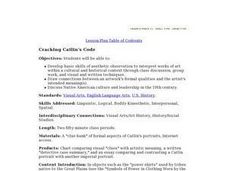Curated OER
The Battle of the Little Bighorn
Students assess how point of view can change a story. In this content area reading lesson, students read about the Battle of the Little Bighorn from three different sources. Students answer questions based upon their reading and draw...
Curated OER
Adapted to Fire
Fourth graders explore forest species' adaptations to fire by participating in a scavenger hunt and mapping a burned forest. Students create maps and explore how indigenous species adapted to living with fire.
Curated OER
Cracking Catlins's Code
Students create a chart comparing visual clues with artistic meaning. This lesson plan is designed to introduce students to the ways in which consistent patterns of gesture and pose chosen by an artist (specifically George Catlin)...
Curated OER
Quilts, Warmth with History
Students examine numerous quilts that show the culture and history of Nebraska. Using the internet, they view quilts from different points in history and discuss them as a class. They examine the role quilts play in discovering...
Curated OER
Traditional Uses of Wood
First graders explore properties of wood used to make cultural items and make a ring and stick game.
Curated OER
In the Light of Reverence
Students watch a documentary prior to participating in a Supreme Court simulation in order to study how religious practices are protected by the First Amendment of the Constitution. They interpret conflict from a number of perspectives...
Curated OER
The Window
Students read a story entitled, "The Window," and discover how some cultures are rejected by others. Students write a letter expressing feelings of rejection and keep a journal of significant events in the story. Using a graphic...
Curated OER
Tree Anatomy
Students learn the basic anatomy of a tree through exploration of tree centers.
Curated OER
the Richness of Rattles: a Lesson in Making And Decorating Clay Rattles
Young scholars study the history behind clay rattles. They form and create a clay rattle using ceramic sculptural techniques and important composition and design elements.
Curated OER
Living History
Students analyze how historians are trying to keep history alive and preserve it for generations to come. They view some schools trying to save an entire culture and language from extinction. Students participate in history preservation...
Curated OER
African Masks (Pre-Visit)
Second graders observe and describe several masks from different parts of Africa housed in the Smithsonian Institute (National Museum of African Art) Washington, D.C. They use the internet to view the Smithsonian's virtual exhibits.
Curated OER
People, Props, and Places - Who Do you Want to Be?
Pupils create a digital self-portrait using the current technology in the schools. They discuss how the portrait is rendered, how the portrait allows us to see into a time period that we are not a part of, and how what she is wearing has...
Curated OER
Lesson 2: Mapping With Words
Students demonstrate an understanding of the personal relationship that Wabanaki peoples had with the land by analyzing selected Wabanaki place names. They practice map-reading and map-making skills.
Curated OER
Rhythm
Fifth graders listen to a song from a compact disc called "Talking Spirits" and discuss whether they have ever heard music like that before and who might be playing the instruments and the music. They try to identify the instruments...
Curated OER
Great North
Students use maps to locate the Arctic Circle, the North Pole and Northern Europe. They draw and label countries within the Arctic Cirlce and identify the groups of people who live there. They also watch and answer questions about the...
Curated OER
Rock Art
First graders create and share their own rock art based on Navajo and Hawaiian rock art.
Curated OER
Centennial: What's in a Name: Utah
Fourth graders research the possible sources for the origin of the name 'Utah'. They discover that printed information can still be disputed and use multiple sources as they list various possibilities for the name origin.
Curated OER
Curiosity Drives Change: Early Pioneers' Sense of Disc
Fifth graders examine the journals of some of the earliest pioneers in Utah. They discover the attitudes of pioneer living and summarize what they have learned.
Curated OER
Language Families
Fourth graders identify and locate the three language families of North Carolina. They calculate the physical area covered by each language family and label them on a map.
Curated OER
Whose Rock Is This Anyway?
Students will seek to understand the events at Pipestone Quarry and what may have caused them. Pipestone Quarry in Pipestone, Minnesota, bears the mythic red Sioux quartzite called Pipestone or Catlinite.
Curated OER
SEEDS WE EAT
Students identify seeds humans eat and do not eat. Students make seed collections, using common kitchen foods. Students display seeds from the foods they serve and discuss them with their guests. Students complete activities which...
Curated OER
Effects of the Spanish Conquest
Fifth graders read and research the effects of the Spanish Conquistadors on the New World. Then they break into small groups and play a game of Jeopardy, using the facts that they have learned.
Curated OER
Art Curators
Students use the Internet to select various works of art around a theme. They create a PowerPoint exhibit of these works and create the written documentation to accompany their presentation. They critique the class exhibits.
Curated OER
What Are the Seasons?
First graders explore seasons and how they are part of a continuous circle.
Other popular searches
- Native American Indians
- Art Native American Indians
- Native American Indians Nj
- Native American Indians 4th
- Native North American Indians

























